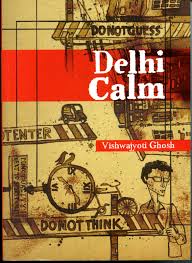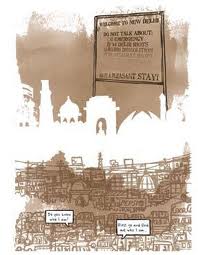
Vishwajyoti Ghosh
NOIDA: HarperCollins, 2010. Purchased in India.
I have written before on this blog that I feel I don’t have the right vocabulary to discuss graphic literature properly. I still feel this way, but I’m trying to become more familiar with the genre, so the last time I was in India I picked up this graphic novel, Delhi Calm.
Delhi Calm is certainly a novel, unlike other works of graphic literature that I’ve read and reviewed, which are compilations or part of a series. It is set in Delhi during Indira Gandhi’s Emergency of the late 1970s, beginning just before the Emergency does, and ending at its abolition. The narrator is a young newspaper employee who finds himself out of a job when his office closes in fear, and becomes involved in underground, anti-government politics. The title comes from an international newspaper headline, the day after the Emergency was declared.
It is difficult to describe a plot as such, because so much of the ‘action’ is visual. The story itself is a fairly predictable exploration of living under the Emergency, but the visual depiction of masked characters are what give the novel depth. The masks hide peoples’ true selves, their real political identities, and what is left visible are generic faces, indistinguishable from each other.
I enjoyed Delhi Calm but I felt it was rather long, at 246 pages (and large pages at that). But then, perhaps the mode of reading a graphic novel is very different from reading text, and I wouldn’t consider a 246 page textual novel too long (unless it was very bad, of course). So I think I need to keep training myself to read this genre more effectively and appreciatively.
(I reviewed the same author’s edited collection, This Side, That Side: Restorying Partition in Kitaab several months ago.)
